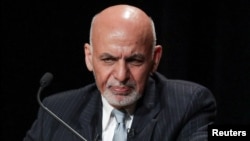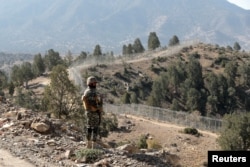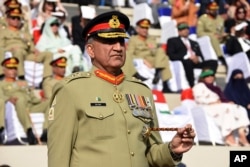Afghan President Ashraf Ghani says he believes an anti-terrorism Islamic edict, or fatwa, issued by Pakistan, should have covered the entire Muslim world, including Ghani’s war-torn nation.
Ghani spoke Wednesday, a day after more than 1,800 Pakistani clerics unveiled the edict at a government-sponsored event in Islamabad. The directive declared as un-Islamic acts that include suicide bombings, sectarianism, and calls for jihad in the name of religion without the consent of the state.
He told a gathering in Kabul of Afghan youths, women, civil society activists and clerics that fatwas issued under Islam have never been confined to geographical boundaries of a single nation. Clerics in the audience voiced their agreement when the Afghan leader asked for their opinion.
"If they [Islamic principles] extend to all [of the world] of Islam, then it [the Pakistani edict] should first and foremost be implemented in relation to Afghanistan," Ghani said.
‘Astonishing’ comments
There was no immediate official reaction in Pakistan to Ghani’s comments, but privately, authorities dismissed them as “astonishing,” citing long-running accusations of Pakistani interference in Afghanistan’s internal affairs.
Analysts viewed Ghani’s criticism as another indication of deep mistrust and tension in relations between the neighboring countries.
Relations between Pakistan and Afghanistan have deteriorated over Kabul’s allegations that Taliban insurgents and their allies are using Pakistani soil for sustaining and expanding insurgent activities.
In turn, Islamabad alleges Afghanistan’s intelligence agency — the National Directorate of Security, with the help of Indian counterparts — is sheltering fugitive Pakistani militants and helping them to plot terrorist attacks against the country.
“It would be inappropriate for Pakistan to pressure or to press upon their clerics to give a statement regarding any other country,” said Zahid Hussain, a Pakistani columnist and author of books on extremism.
Instead of taking “a narrow view” of the edict, President Ghani should have appreciated Pakistan’s effort rather criticizing it,” Hussain said.
Doing all it can
Afghan officials say that during a visit to Kabul last October, Pakistani military chief General Qamar Javed Bajwa had assured Ghani he would seek a fatwa from Pakistani clerics with regard to the Afghan conflict. Pakistani officials have not confirmed those assertions.
Pakistani Interior Minister Ahsan Iqbal, while addressing Tuesday’s ceremony where the edict in question was announced, reiterated that his country is doing all it can to fight terrorism and has suffered tens of thousands of casualties in the process, in addition to massive economic losses.
“Terrorism has no place in Islam, whether against our own people or against other people. Pakistan is committed to not allowing any group to use its territory to carry out any act of terrorism against anybody. What is not good for us is not good for others also,” Iqbal said.
Government under fire
The government itself has been under fire since issuing the fatwa. Critics, such as rights activist Tahira Abdullah, raised objections about the participation of certain clerics at Tuesday’s event.
She said the list of those invited to the conference, held in the office of President Mamnoon Hussainin Islamabad, contained names of clerics with ties to banned Islamic organizations.
“We strongly protest and condemn this blatantly obvious — but failed —attempt to confer respectability and legitimacy on religious-political organizations, individuals, and groups, which are either proscribed themselves, or have very close links with such entities,” Abdullah said.
The activist said she saw the participation of controversial clerics as part of alleged official efforts to mainstream extremist groups in national politics.
“This is a monster, which will boomerang back at us all,” she said.
The Pakistani fatwa was ratified by, among others, Muhammad Ahmed Ludhianvi, who is known for his ties to the outlawed Sunni-based sectarian group, Ahle Sunnat Wal Jamaat (ASWJ). Authorities accuse the group of being behind attacks on Pakistan’s minority Shiite community.
Another signatory was Hamid-ul-Haq, the son of the Pakistani cleric Sami-ul-Haq, who is widely referred to as the “Father of the Afghan Taliban.” The cleric’s Islamic seminary, near the northwestern city of Peshawar, is where prominent radical leaders, including Taliban founder Mullah Mohammed Omar, received an education.


